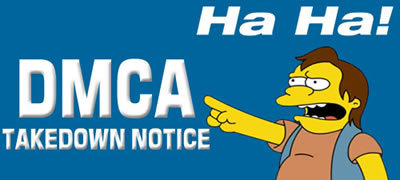


If a streamer chooses to contest an alleged copyright holder’s claim, the DMCA permits a streamer to send a “counter notice” to the complaining party alleging the material at issue is not infringing. However, some streamers may choose to refuse to remove their infringing material, and respond to a takedown notification. To avoid liability, it would be prudent for a streamer to self-audit their content, obtain licenses for music they would like to utilize, or use public domain music. Generally, almost all popular music is subject to copyright registrations, and it’s possible that copyright infringers will be subjected to statutory damages and attorneys’ fees for violating copyright law.
#Dmca takedown serial#
However, many copyright holders choose not to pursue infringement claims as long as the subject content is promptly removed, and the user is not a serial offender. The user has an opportunity to object and contest the notice, as detailed below.Īlthough the ISPs can avoid liability by following the requirements of the DMCA, the streamers who synchronized music to their videos remain at risk for copyright infringement even if the content has been removed. Specifically, the ISP is required to remove the subject content and notify the user of the DMCA takedown notice. Among those requirements is promptly responding to “takedown notices” received from copyright holders. The DMCA, among other things, provides ISPs, such as Twitch, with immunity from liability for copyright infringement with respect to content posted by their users if the ISP follows the strict requirements of the DMCA. Below, we briefly explore the issue and the law surrounding it. For some of those streamers, deleting thousands of videos would cost significant time and money, and threaten future viewership. Given the huge volume of streaming content on Twitch, this meant some streamers have been hit with thousands of DMCA takedown notices. With the music licensing business having ground to a halt, the performing rights organizations responsible for licensing and enforcing rights in popular music have turned their resources instead toward pursuing infringements. One reason for this is the pandemic-induced lack of public performances involving live and synchronized music. These infringement claims involving music that is “synchronized” to video content have accelerated significantly on all platforms during the pandemic. This was a somewhat common practice until June 2020, when streamers began receiving notices from Twitch that DMCA takedown requests were submitted for clips with copyrighted background music from 2017 to 2019. Some background: In order to advertise their Twitch channels, streamers create “clips” made up of highlights of their live streams in order to attract viewers, which often, include background music.
/cdn.vox-cdn.com/uploads/chorus_image/image/67662122/acastro_200901_1777_twitch_0003.0.0.jpg)
Notably, streamers are increasingly having their content challenged for copyright infringement in the form of Digital Millennium Copyright Act (DMCA) claims made against their internet service provider (ISP) platforms (Twitch or YouTube). This developing opportunity has come with new risks and hazards. Live streams of video gamers garner countless views, and many of these streamers have made careers of distributing and monetizing content.

The increased activity has meant substantial growth for streaming platforms including Twitch and YouTube Gaming. For several months, live sporting events were halted because of the pandemic, yet during this period of uncertainty, the esports ecosystem has been active and thriving.


 0 kommentar(er)
0 kommentar(er)
